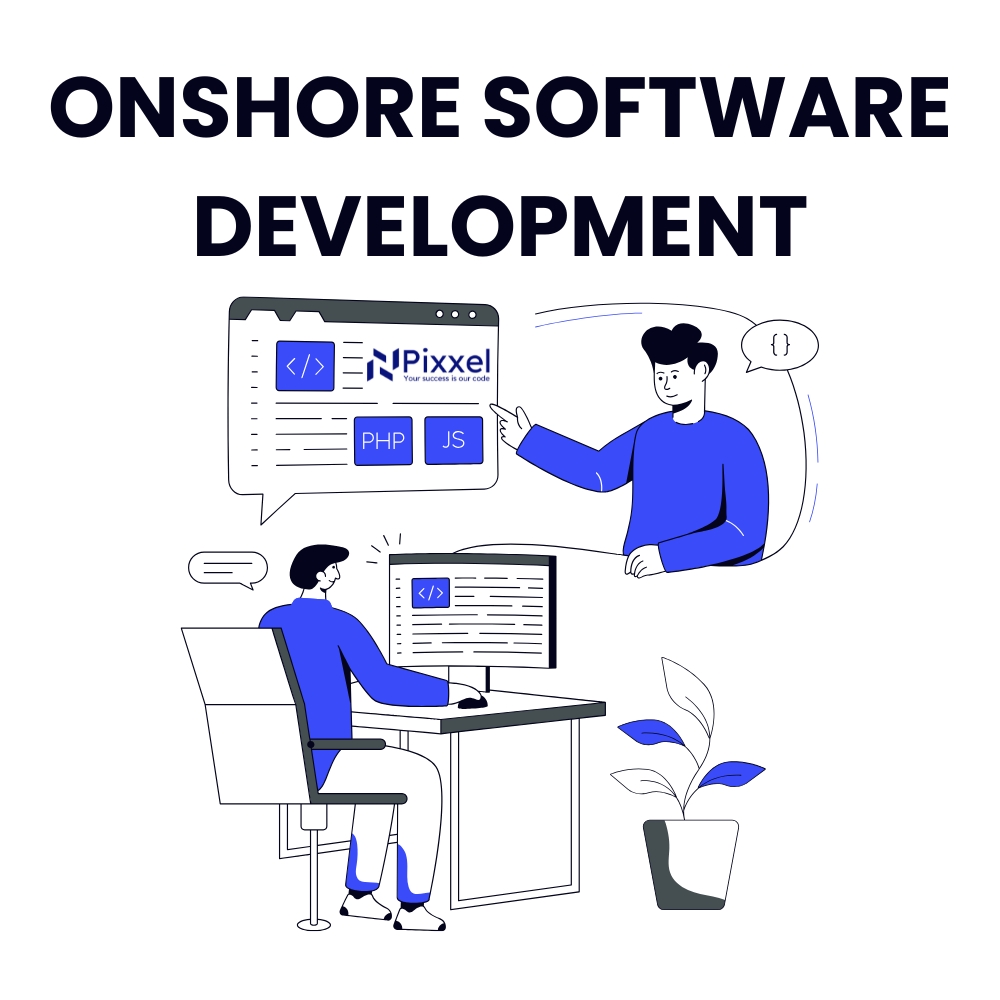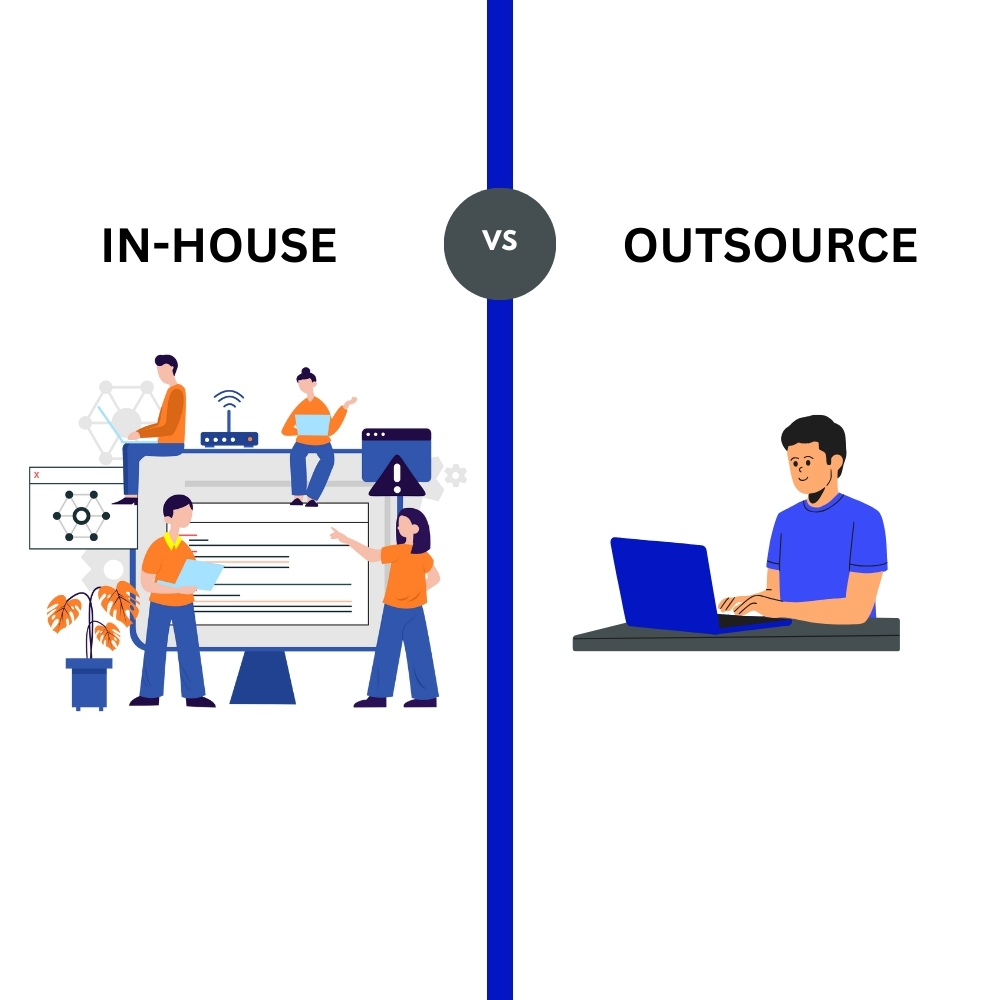Crafting software is no small feat. Choosing the right development approach can make or break your project. A report from Deloitte reveals that 70% of companies outsource development to save costs, but cost alone isn’t the whole story. When precision, compliance, and seamless collaboration are your top priorities, onshore software development stands out.
Imagine working with a team that shares your time zone, speaks your language, and understands your business culture. No late-night calls. No lost context. Just smooth, effective collaboration. Onshore development isn’t just about convenience—it’s about getting things done right, the first time.
In this blog, we’ll dive deep into what onshore software development is, its benefits, and why it might be the perfect choice for your next big idea. Whether you’re leading a healthcare project or navigating tight compliance regulations, you’ll find actionable insights here to guide your decision. Let’s get started!
Key Takeaways
- Onshore software development ensures better communication, compliance, and quality outcomes.
- It’s ideal for projects needing close collaboration, quick feedback, or strict adherence to local regulations.
- While more expensive, onshore development offers hidden cost savings and better ROI for complex tasks.
- Industries like healthcare, government, and education benefit significantly from onshore teams.
- Finding the right partner requires evaluating expertise, transparency, and reputation.
Understanding Onshore Software Development
Onshore software development means working with a team located in the same country as your business.
Onshore software development offers several distinct features that make it stand out. These characteristics highlight its focus on effective collaboration and ensuring quality outcomes.
- Development team located within the same country
- Operates under local labor laws and regulations
- Works within the same time zone as the client
- Uses native language for communication
- Follows national data protection and cybersecurity standards
- Allows in-person meetings and onsite collaboration
- Higher operational costs due to local salaries and expenses
- Easier access to legal recourse in case of disputes
Onshoring Vs. Nearshoring Vs. Offshoring
| Aspect | Onshoring | Nearshoring | Offshoring |
|---|---|---|---|
| Key Definition | Hiring teams within your own country for close oversight. | Working with a team in a nearby country with minimal time zone differences. | Hiring external developers in a different country. |
| Team Commitment & Duration | Provides the best alignment with local operations. | Better alignment with time zones for easier collaboration. | Scalable teams according to your project needs. |
| Pros | High oversight and real-time collaboration. | Real-time collaboration, cultural familiarity. | Cost savings, access to global talent. |
| Cons | Most expensive option. | May not achieve the same cost efficiency as offshoring. | Cultural and time zone differences may arise. |
Projects Best Suited for Onshore Software Development?
Onshore software development works particularly well for certain types of projects. These include tasks that require close collaboration, quick feedback, or strict adherence to regulations.
- Projects requiring close collaboration – Ideal for tasks needing frequent stakeholder input, evolving requirements, and real-time feedback, ensuring smooth execution for complex or high-visibility projects.
- Quick iterations and feedback – Perfect for creative, interactive, or agile projects that demand fast adjustments and seamless collaboration.
- Compliance-heavy applications – Best for industries like healthcare and finance, where strict regulations (e.g., GDPR, HIPAA, PCI DSS) require secure, legally compliant software solutions.
- Confidential data handling – Suited for projects managing sensitive information, where security, privacy, and risk mitigation are critical.
Benefits of Choosing Onshore Software Development
Choosing onshore software development comes with several advantages that make it a preferred option for many businesses.
- Faster collaboration and decision-making with real-time communication and face-to-face interactions.
- Local teams ensure high-quality standards through testing, compliance, and tailored solutions.
- Better timeline control with regular updates and immediate feedback.
- Onshore teams minimize legal and compliance risks by following data protection laws.
- Local market expertise ensures software meets customer demands.
- Proximity enables real-time troubleshooting, tailored updates, and continuous improvements.
- Local development teams provide trust through security, accountability, and ethical practices.
Improved Collaboration and Faster Decision-Making
Onshore development enables us to ensure close collaboration between your business and our software team. Real-time interactions make it easier to communicate ideas, refine project requirements, and address issues as they arise.
Face-to-face meetings help eliminate misunderstandings, while instant feedback ensures that the development process remains agile and responsive. With fewer cultural and language barriers, problem-solving becomes more efficient, keeping the project on the right path.
High-Quality Deliverables and Robust Quality Assurance
Working with our onshore team guarantees access to skilled professionals who are accustomed to high-quality standards. Our developers understand industry-specific requirements, ensuring compliance with best practices and regulatory guidelines.
They conduct extensive testing, fine-tune products based on feedback, and provide tailored solutions that align with business objectives. With direct oversight, businesses can be confident that their software meets expectations in functionality, security, and usability.
Better Control Over Project Timelines
Our onshore development team provides you with clear project roadmaps, ensuring that deadlines are met with minimal disruptions. Regular progress updates and scheduled meetings help in tracking milestones, addressing concerns, and implementing changes efficiently.
Proximity allows for immediate action when adjustments are needed, reducing the risk of costly delays and ensuring that the project remains on schedule.
Reduced Risks of Legal or Compliance Issues
Compliance with local laws and data protection regulations is a significant concern in software development. Our onshore developers have a thorough understanding of national and international legal frameworks.
We ensure that the project aligns with data privacy laws, intellectual property rights, and industry-specific regulations. It allows you to benefit from stronger contractual agreements, clearer accountability, and reduced risks associated with cross-border legal challenges.
Streamlined Troubleshooting and Post-Launch Support
Post-launch software support is critical for maintaining performance and resolving potential issues. Our onshore teams can quickly address technical glitches, implement updates, and provide long-term maintenance without the delays associated with offshore teams in different time zones.
Their ability to respond promptly to challenges ensures business continuity and helps you adapt your software to evolving needs.
Challenges Of Onshore Software Development
While onshore development has many advantages, there are some challenges to consider. These often revolve around cost and resource availability.
- Higher costs make onshore development less accessible for startups.
- Limited talent pool can restrict access to specialized expertise.
- High competition for skilled developers may delay projects.
Higher costs compared to offshore options
One of the biggest challenges of onshore software development is the higher cost. Compared to offshore options, where labor costs are lower, hiring local developers can be significantly more expensive.
However, for critical projects requiring close collaboration, high-quality standards, and legal compliance, the investment is often worthwhile.
Limited access to a diverse talent pool
Unlike offshore development, which provides access to a global workforce, onshore teams may have a more limited selection of specialists. If a project requires niche expertise that isn’t widely available locally, companies might struggle to find the right talent.
This constraint can slow down the development process or force businesses to settle for alternatives that may not fully meet their needs.
Competition for skilled local developers
In many regions, there is a high demand for experienced software developers, which can lead to several challenges. First, you may face longer wait times to start projects due to availability issues.
Skilled developers are often booked well in advance, requiring businesses to plan ahead or risk delays. Additionally, organizations may need to compromise on either project timelines or expertise, depending on what is available in the local job market.
Finding the Right Onshore Software Development Partner
Finding the right partner is crucial for success. There are many factors that determine how you choose a software development company. It involves evaluating their expertise, reputation, and approach to collaboration.
- Assessing reliability by choosing partners with a proven track record.
- Industry-specific expertise ensures developers understand your sector.
- Transparent communication provides clear updates, pricing, and expectations.
- Managing expectations aligns project goals, timelines, and deliverables.
Evaluate Portfolios and Client Testimonials
A development partner’s portfolio is a strong indicator of their capabilities. Reviewing past projects can help determine if their expertise aligns with your needs. Look for case studies that highlight successful projects, particularly those similar to your own.
Client testimonials and reviews can also provide valuable insights into their reliability, responsiveness, and ability to deliver results. A proven track record is essential for ensuring quality and minimizing risks.
If you’re looking for a software development company, feel free to get in touch. We are a European-based company with project management in Austria and developer teams across Europe (also Austria), focusing on the ideal price-value ratio. We know what we’re talking about: teams from India or offshoring to super-cheap countries can often end up costing more in the long run due to poor quality. Don’t make these mistakes!
Check for Industry-Specific Expertise
Every industry has unique requirements, so selecting a partner with relevant experience can significantly impact the outcome of your project. A development team familiar with your sector will understand compliance requirements, industry challenges, and best practices.
For instance, healthcare companies should seek developers experienced in medical regulations like HIPAA, while finance-related projects require knowledge of data security standards. Specialized expertise ensures that your software is designed with industry-specific needs in mind.
Prioritize Transparency and Clear Communication
A good development partner fosters trust through transparency and open communication. Regular project updates, clear timelines, and well-defined deliverables help prevent misunderstandings and delays.
They should offer structured communication channels for addressing concerns, discussing modifications, and ensuring that your project stays on track. Additionally, transparency in pricing, scope, and potential risks is essential for avoiding unexpected costs and ensuring a smooth development process.






